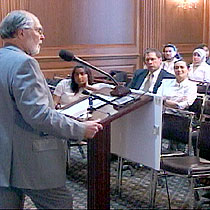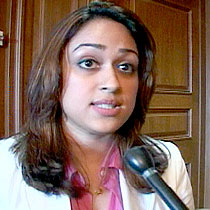2007年VOA标准英语-Muslim Women from Around the World Join a Leade
搜索关注在线英语听力室公众号:tingroom,领取免费英语资料大礼包。
(单词翻译)
By Mohamed ElshinnawiWashington
23 July 2007
A group of Muslim women from around the world is participating in a summer leadership program at the U.S Congress and George Washington University. The program is designed to educate the participants about legal issues and conflict resolution techniques with the aim of empowering Muslim women to promote peaceful change in their communities. Mohamed Elshinnawi has more.
 |
| Seyyed Hossein Nasr |
Seyyed Hossein Nasr -- a renowned2 scholar of Islam at George Washington University -- told the audience that violations3 of women's rights in many Muslim countries should not be blamed on Islamic law, but on undemocratic governments.
But he also said there needs to be a new conceptualization of the role of women in Islamic countries. "What we need is a kind of Islamic feminine movement, not feminist4, to clarify, first of all, what are the Koranic and Hadith rights of Muslim women. Secondly5, how Islam sees the function of women. They do not have to be like in the West. Nobody said that American women are very happy to be superwomen, doing ten things at the same time."
He says when women in Iran were forced to remove their veils, there was a backlash decades later that forced every woman to be veiled. Nasr went on to call on the West not to make the same mistake by making the way Muslim women dress a major issue.
Aziza Al-Hibri, law professor at the University of Richmond, is the founder6 and President of Muslim Women Lawyers for Human Rights. She says the leadership program is designed to educate Muslim women about legal issues of importance to them. "We teach them not only Islamic law because some of them do not know it as they should, but also we teach them leadership skills that allows them to go back to their communities and converse7 positively8 towards change."
The training program focuses on traditional Islamic jurisprudence and how Muslim women around the world can deal with issues such as domestic violence and other abuses against women.
 |
| Nadia Mohamed |
Other participants have similar goals. Anissa Auhanoaf, a second-generation Muslim immigrant to Belgium, hopes the leadership program will equip her with a comparative perspective on human rights in Islam. "I need to know more just to compare with human rights as I know them from my knowledge because of my Masters degree in political sciences, but next to that I would like to know more to apply in my responses in debates and dialogues."
Ghada Ghazal, a member of the Islamic Studies Center in Damascus, Syria finds an added value to the leadership program. "We have a lot of misconception on both sides and this is due to many factors, one of them is the media. So I think meeting person to person will give many solutions to many problems."
Sponsors of the program are hopeful that these Muslim women will eventually be able to articulate and defend Muslim women's rights within their own cultural and institutional contexts.




